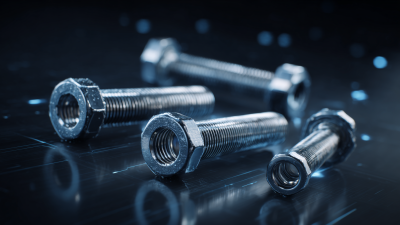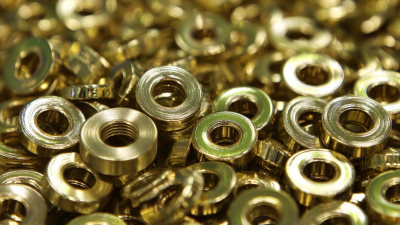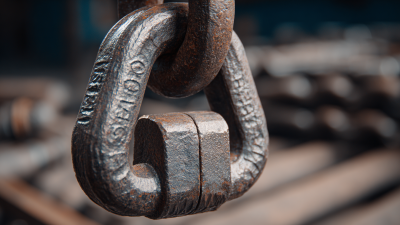In today's ever-evolving landscape of security threats, the importance of robust fastening solutions cannot be overstated. Security bolts, designed to provide enhanced resistance against tampering and unauthorized access, play a crucial role in safeguarding valuable assets across various industries. According to a report by the Global Security Products Market, the demand for security fastening solutions is projected to grow by 5.4% annually over the next five years, driven by increasing concerns over theft and vandalism. Different types of security bolts, such as anti-theft and tamper-proof variants, offer unique benefits tailored to specific applications—from construction to automotive sectors. This blog will delve into an ultimate comparison of these security bolts, exploring their features, advantages, and ideal uses to help you make informed choices in securing your environment effectively.

When exploring the world of security bolts, understanding their key features and applications is crucial for selecting the right product. Security bolts can vary widely in design and function, offering a range of solutions tailored to specific needs—from simple installations to complex security systems. The strength, durability, and resistance to tampering are often key indicators of their effectiveness. For example, heavy-duty security bolts made from hardened steel often provide superior protection in high-risk environments, whereas standard bolts may suffice for general use.
The importance of security bolts is underscored by the growing demand for advanced locking mechanisms across various sectors, including residential, commercial, and automotive applications. As evidenced by market research, the global smart door lock market is expected to surge from $3.50 billion in 2025 to $13.44 billion by 2032, reflecting a compound annual growth rate (CAGR) of 21.2%. This growth signals an increasing recognition of the role security bolts play in integrated security solutions, as they are essential in securing doors against unauthorized access. Understanding the varied applications of different types of security bolts can empower consumers and businesses alike to make informed decisions about their security measures.
When choosing the right fastening solution for a project, understanding the differences between standard and specialty security bolts is crucial. Standard security bolts, commonly made from carbon steel, offer basic protection against tampering and unauthorized access. According to a report by the International Association of Lock Manufacturers, standard security bolts account for approximately 60% of the marketplace due to their cost-effectiveness and adequate security for everyday applications.

In contrast, specialty security bolts, which include features such as anti-drill, anti-pull, and unique head designs, provide an elevated level of security suited for high-risk environments. A 2022 study by the Security Industry Association indicates that while specialty bolts represent only about 25% of the market, they are preferred in applications such as banking, data centers, and government facilities, where advanced security measures are paramount. The investment in specialty bolts can significantly reduce the risk of breaches, making them a vital consideration for those requiring enhanced protection.
When selecting the right security bolt for various materials and conditions, it is essential to consider the specific requirements of your application. Different materials, such as wood, metal, concrete, or plastic, demand different types of security bolts to ensure optimal effectiveness. For instance, when fastening to wood, lag bolts are often recommended due to their increased holding strength and ability to resist withdrawal forces. On the other hand, when securing metal components, you may want to use carriage bolts or security screws designed for enhanced resistance against tampering.
Additionally, environmental conditions play a crucial role in your choice of security bolts. For outdoor applications, corrosion-resistant materials like stainless steel or coated bolts are ideal to withstand harsh weather conditions. For instances where vibration or movement is a concern, employing locking bolts or nylon-insert lock nuts may provide the necessary stability. Understanding these dynamics not only helps in maximizing security but also extends the longevity of your installations across various settings.

When it comes to installing security bolts, following best practices ensures optimal performance and safety. One key tip is to choose the right type of bolt for your application. Different materials and designs cater to various needs; for instance, tamper-resistant bolts are ideal for high-security areas, while corrosion-resistant options work best in outdoor settings. Always assess the environment and specific security challenges to make an informed selection.
Another vital aspect is ensuring that the installation surface is prepared correctly. Clean the area to remove any dust or debris that may impede the bolt’s grip. Additionally, it’s crucial to pre-drill holes to avoid damaging the wall or surface material, which can compromise the bolt's effectiveness. Using the correct drill bit size is paramount; too large, and the bolt won't anchor securely, too small, and it may not fit properly.
Finally, pay attention to torque settings when tightening security bolts. Over-tightening can cause damage, while under-tightening may lead to a compromised security level. Use a torque wrench to achieve the manufacturer’s specifications for best results. Proper installation not only enhances security but also prolongs the lifespan of your hardware.
| Bolt Type | Material | Corrosion Resistance | Typical Applications | Installation Tips |
|---|---|---|---|---|
| Hex Head Bolt | Steel | Medium | Construction, Machinery | Use a torque wrench for proper tension. |
| Tamper-Proof Security Bolt | Stainless Steel | High | Public Warnings, High-Security Areas | Ensure proper tool is used for installation. |
| Carriage Bolt | Galvanized Steel | Moderate | Wood Structures, Outdoor Furniture | Pre-drill a hole for easy insertion. |
| Expansion Bolt | Carbon Steel | Low | Concrete, Brick Walls | Ensure hole is dust-free to enhance grip. |
| Socket Head Cap Screw | Alloy Steel | Medium to High | Machinery, Automotive | Use hex key for installation to avoid slippage. |
When it comes to security solutions, investing in high-quality security bolts is crucial for safeguarding valuable assets. According to a report by the Security Industry Association (SIA), the total cost of theft and property damage in the U.S. reached approximately $17 billion in 2022. This staggering figure underscores the importance of choosing the right security measures, particularly bolts, which serve as the first line of defense. High-quality security bolts are engineered to resist tampering and forced entry, providing peace of mind for both commercial and residential applications.
Conducting a cost-benefit analysis reveals that while premium security bolts may come with a higher upfront cost—often 20-50% more than standard options—the long-term savings and advantages are noteworthy. A study from the National Institute of Standards and Technology (NIST) indicates that investing in stronger security measures can decrease potential loss by up to 80%. Furthermore, high-quality bolts typically come with warranties and certifications that enhance reliability and performance, reducing the need for frequent replacements or repairs. When assessing the overall value, the upfront investment in superior security products is justified by their enhanced durability and effectiveness in protecting against crime.






